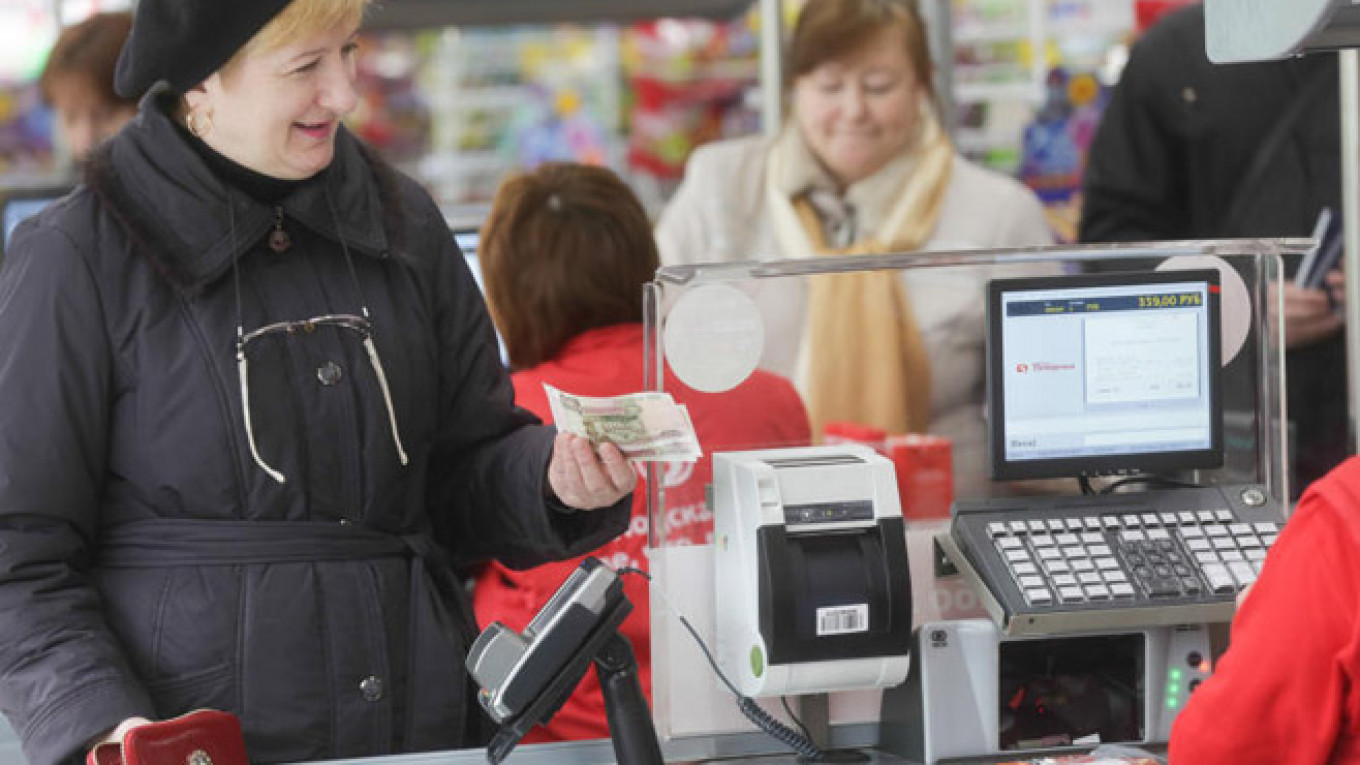Nearly 20 percent of Russians can now afford nothing more than the absolute necessities as double-digit inflation erodes their spending power, a survey by consumer research firm Nielsen found.
The figure is a record high for the survey, which has been conducted regularly since 2005. Even in the first quarter of 2009, in the depths of the previous financial crisis, only 4 to 7 percent of Russians reported having no spare income after paying for basic items such as food and accommodation.
Runaway price rises are making it harder to make ends meet. Consumer price inflation was running at 16.4 percent in April this year after hitting a 13-year high of 16.9 percent in March, according to state statistics service Rosstat. Prices have been driven up by Russia's ban on a range of food imports from the West — a response to Western sanctions over Ukraine — and a steep devaluation of the Russian currency.
High inflation has depressed real wages, which fell 9.3 percent year-on-year in March, according to Rosstat. It has also encouraged some unwise behavior — Many Russians flocked to stores late last year as the ruble plummeted against the euro and dollar, eager to get the most out of their savings before the prices of imported goods rose.
This wave of spending is now coming back to haunt consumers, Ilona Lepp, Nielsen's commercial director for Russia, said in a statement.
"After spending a lot at the end of 2014, Russians ran up against a significant rise in prices on the most essential goods in the beginning of the year, which means the drop in real wages was felt particularly hard," Lepp said.
Russians' consumer confidence fell to a record low of 72 points in the first quarter on Nielsen's Consumer Confidence Index, a seven-point dip from the previous quarter.
With falling real wages forcing Russians to reduce spending, 55 percent of respondents to the survey said they would cut back on entertainment outside the home. Fifty percent said they would save on clothing purchases and 48 percent planned to switch to cheaper food brands.
Such cutbacks brought overall consumer spending in Russia down 8.7 percent year-on-year in March, damaging a key sector of the economy and deepening an economic slowdown that is expected to shrink the country's gross domestic product by up to 5 percent this year.
The survey, part of Nielsen's global consumer confidence study, was carried out among Internet users between Feb. 23 and March 13 of this year. The margin of error did not exceed 0.6 percent.
Contact the author at [email protected]
A Message from The Moscow Times:
Dear readers,
We are facing unprecedented challenges. Russia's Prosecutor General's Office has designated The Moscow Times as an "undesirable" organization, criminalizing our work and putting our staff at risk of prosecution. This follows our earlier unjust labeling as a "foreign agent."
These actions are direct attempts to silence independent journalism in Russia. The authorities claim our work "discredits the decisions of the Russian leadership." We see things differently: we strive to provide accurate, unbiased reporting on Russia.
We, the journalists of The Moscow Times, refuse to be silenced. But to continue our work, we need your help.
Your support, no matter how small, makes a world of difference. If you can, please support us monthly starting from just $2. It's quick to set up, and every contribution makes a significant impact.
By supporting The Moscow Times, you're defending open, independent journalism in the face of repression. Thank you for standing with us.
Remind me later.


